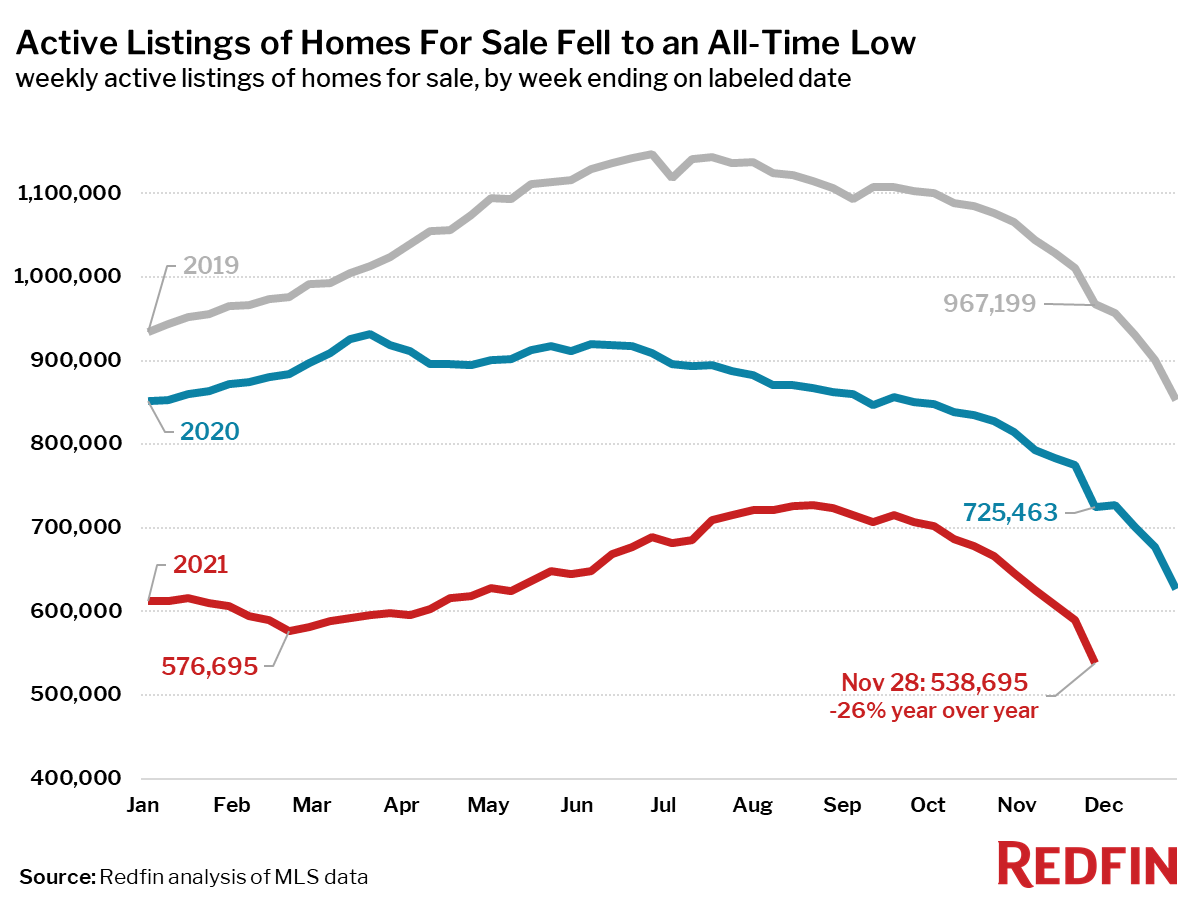
Real Estate Supply, Demand, and Investor Plans for 2022

Supply, demand, and investors
Housing supply is not keeping up with demand, here’s how investors should position themselves.
📰 In this issue:
- There is a shortage of 1.35 homes in the U.S., and 76% of builders said that the overall supply of lots in their areas was “low to very low.”
- Demand is also rising which will keep prices elevated in the medium term.
- This means the coming years will see increasing prices and competition for properties, making it more difficult for investors to acquire.
Supply is low
🏡 Supply: A new report from Zillow shows that there is a shortage of 1.35 million homes in the U.S. At today’s homebuilding rate, this represents 2.7 years’ worth of permits. The biggest shortfalls relative to population growth are in Dallas, Miami, Phoenix and Seattle. This has served to increase competition and prices in most U.S. metros.
🏡 Supply: Redfin also reported that November saw an all-time low of homes for sale, with the platform suggesting it will be a difficult winter for those looking to purchase.
Source: Redfin
And, property sales are moving quickly. Redfin reports that 45% of sales contracts had an accepted offer within two weeks of being on the market, and 33% within one week. This is up from 27% in 2020, and 18% in 2019.
🏡 Supply: Builders are also finding it hard to find lots to develop on. According to a National Association of Homebuilders (NAHB) survey, 76% of builders said that the overall supply of lots in their areas was “low to very low.” This is a record, by a wide margin according to NAHB, with the previous record being 65% in 2018. As such, builders are turning to infills or teardowns, which now account for 1 in 4 new construction projects in the U.S.
📢 Quick Take: “The number of homes for sale typically declines another 15% in December...That means that by the end of the year, there will likely be 100,000 fewer homes for sale than there were in February when housing supply last hit rock bottom. I think more new listings will hit the market in the new year, but there will also be a long line of buyers who are queuing up right now...In this extremely tight housing market, we would quickly see a proportional increase in competition and home prices.” — Redfin Chief Economist Daryl Fairweather
🤷🏽♀️ So What? We are years away from a more balanced market where supply and demand are in sync. This means rising prices and competition are factors that investors will grapple with for the foreseeable future. Investors should be looking at more affordable markets with both strong rent and population growth.
Demand is high
📈 Demand: Supply being low is one thing, but demand is also at record highs according to a number of reports. CoreLogic reports that annual home price growth increased to 18% in October, the highest ever recorded in the company’s 45-year index history.
📈 Demand: Zillow reported recently that inflation pressures will also further boost demand for housing. “If American household incomes are rising about as fast as non-shelter prices, then that would mostly cancel out the negative income effect and leave the positive substitution effect – boosting housing demand.” Translated: If incomes go up, as they tend to do during inflationary times, people will have more money to spend, including on housing.
📢 Quick Take: “Despite the anticipated eventual return to normal, the pandemic is expected to permanently raise the floor for US home prices. In their November housing forecast, economists at Fannie Mae predicted that the median price of a previously owned home would surpass $400,000 by the middle of 2023. The firm said the median new-home price would likely hit a record high of $464,000 by the end of 2023, roughly $100,000 higher than it was at the start of 2021.” — Jason Lalljee, Business Insider
🤷🏽♀️ So What? Strong demand and rising prices mean that investors who choose to sit on the sidelines waiting for a correction will be disappointed. Focusing on affordable markets in the coming years will be a winning strategy. Despite the current high price of acquisition, it appears as though housing costs will only increase further given strong demand and low supply.

About David Lecko
David Lecko is the CEO of DealMachine. DealMachine helps real estate investors get more deals for less money with software for lead generation, lead filtering and targeting, marketing and outreach, and acquisitions and dispositions.



